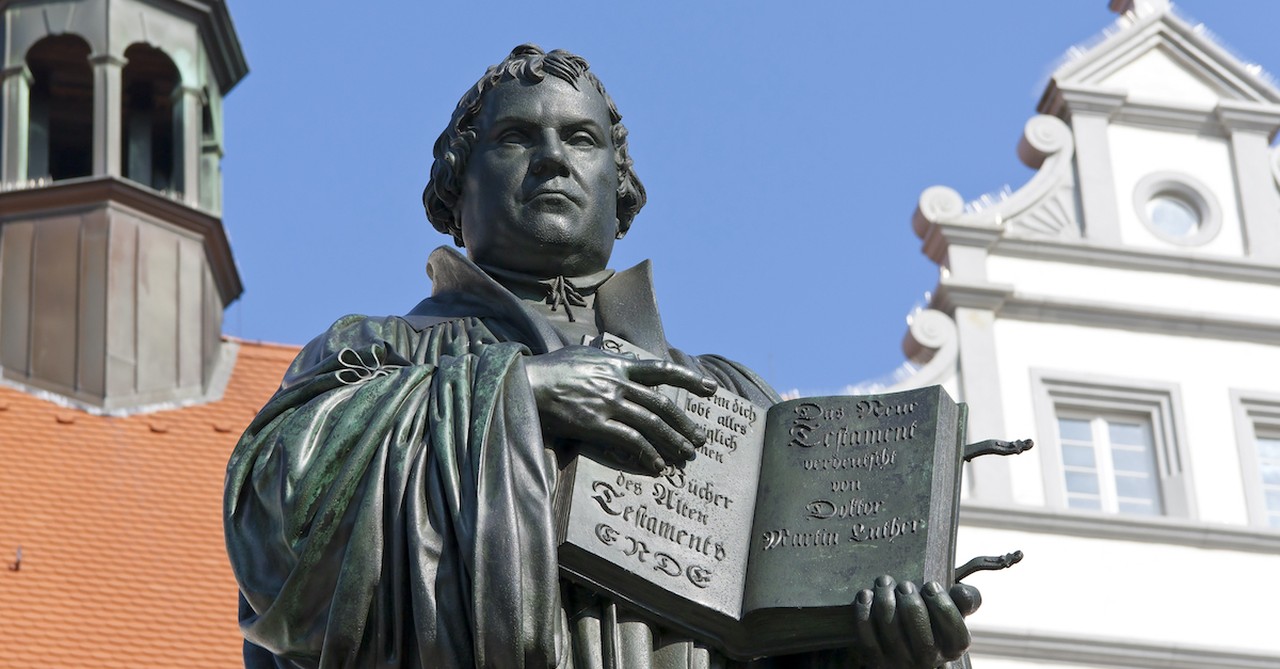6 Reasons Christians Should Celebrate Reformation Day

Usually, when October 31st is mentioned, most people think of Halloween, even many Christians, not realizing how this is a historic date in Church history and a day believers in Jesus Christ have much reason to celebrate. So what is Reformation Day? And why should we, as Christians, celebrate it, especially in America?
Before the Reformation Began
Martin Luther, born November 10, 1483, in Eisleben, Germany, grew up to be the catalyst for the Reformation. His spiritual journey took off in 1505 during a thunderstorm while studying law at the University of Erfurt. Terrified by a bolt of lightning striking near him, in exchange for divine protection, he promised St. Anne that he would become a monk if she would spare his life. Although Luther’s miner father strongly disapproved, Luther diligently pursued becoming a monk, to the point of whipping himself raw as a way to appease the wrath of a holy God and to deserve heaven. He also regularly confessed his sins up to six hours a day. However, through studying the Scriptures, the Holy Spirit revealed to Luther that the just shall live by faith and that none of his self-afflictions would justify him before God but only comes through faith in Jesus Christ.
Photo credit: ©GettyImages/JohnnyGreig
What Sparked the Beginning of the Reformation?

What Sparked the Beginning of the Reformation?
SLIDE 1 OF 5
With his new revelation concerning Salvation, Luther recognized and became disillusioned by the errors in the Church’s teaching and practices, including selling indulgences to raise money and convincing individuals that their giving of money for their deceased relatives could release them from purgatory. On October 31, 1517, with hopes of sparking an academic debate and reform, Luther wrote 95 theses against this revenue-generating scheme, along with some other abuses he found within the Church, and nailed his document on the Wittenberg, Germany Cathedral door for all to see, a common practice at the time.
However, the Church wasn’t open to Luther’s corrections and didn’t approve of the spreading of his findings via the newly invented printing press. As his ideas spread throughout Germany, they stirred up much controversy and led to the Church Council in 1521 to demand Luther recant his theses.
Luther’s Firm Stand Ushered in the Reformation
But Luther refused, stating, “Unless I am convinced by the testimony of the Holy Scriptures or by evident reason—for I can believe neither pope nor councils alone, as it is clear that they have erred repeatedly and contradicted themselves—I consider myself convicted by the testimony of Holy Scripture, which is my bases: my conscience is captive to the Word of God. Thus, I cannot and will not recant, because acting against one’s conscience is neither safe nor sound. God help me. Amen.”
Luther paid dearly for his stand, being excommunicated from the Catholic Church in 1521 by Pope Leo X. Because he would not recant, he was declared an outlaw and heretic and had to run for his life, finding refuge in Wartburg Castle with Fredrick the Wise, under an assumed name and disguise.
It was a time well spent, too, when Luther translated the Bible into German, putting it into the hands of the people. The Reformation ushered in a new era, placing God’s Word in the hands of individuals and birthed the Protestant Churches that are still impacting the world today.
Photo credit: ©GettyImages/typo-graphics
6 Reasons to Celebrate Reformation Day

6 Reasons to Celebrate Reformation Day
SLIDE 2 OF 5
Looking at the life of Martin Luther, we see how God influenced generations to come through his determination to stand firm on his convictions and not waiver when pressured to renounce his beliefs. Some see Luther as a rebellious monk, but his heart was to bring reform and correction to the Church he loved. By kick starting the Reformation, Luther revolutionized Christianity.
The following are 6 reasons why Christians should celebrate the Reformation:
1. The Reformation Revealed the Biblical Truth That We Are Saved by Faith, Not Works
Troubled by some of the practices taking place in the Catholic Church, Luther searched the Scriptures to find the basis for them. In studying God’s Word for himself, the Holy Spirit revealed the truth that we are saved by grace, not by works. Ephesians 2:8 reveals, “For it is by grace you have been saved, through faith—and this is not from yourselves, it is the gift of God.”
In Luther’s goal to correct the practices of the Catholic Church, he ended up revolutionizing Christianity, bringing the truth of Salvation to the world. “I simply taught, preached, and wrote God’s word;” wrote Luther. “Otherwise I did nothing…as the Word did it all.”
Photo credit: ©GettyImages/ZU_09
2. The Reformation Put the Bible in the Hands of Individuals

2. The Reformation Put the Bible in the Hands of Individuals
SLIDE 3 OF 5
Luther understood how getting the Bible into people’s hands would change their hearts, as Hebrews 4:12 explains, “For the word of God is alive and active. Sharper than any double-edged sword, it penetrates even to dividing soul and spirit, joints and marrow; it judges the thoughts and attitudes of the heart.”
The Reformation changed world history by placing the Bible into the hands of people. Luther’s translation of it into German helped to transform the German language, as well as bring biblical education to the masses. He took 2 Timothy 2:15 seriously in his handling of it. “Do your best to present yourself to God as one approved, a worker who does not need to be ashamed and who correctly handles the word of truth.”
Luther urged individuals to read the Bible themselves, which was vital for the Reformation to have a long-lasting effect. For it to have momentum in transforming lives, people needed to read and study God’s Word on their own. Luther believed what 2 Timothy 3:16, teaches, that “All Scripture is God-breathed and is useful for teaching, rebuking, correcting and training in righteousness.”
Photo credit: ©GettyImages/RomoloTavani
3. The Reformation Encouraged Congregational Worship

3. The Reformation Encouraged Congregational Worship
SLIDE 4 OF 5
Luther encouraged singing music in the Church based on Scriptural truth, emphasizing the congregational singing of God’s Word through biblical lyrics. He urged what Psalm 105:2 urges, “Sing to Him, sing praise to Him, tell of all His wonderful acts.” He was a strong supporter of Ephesians 5:19, “Speaking to one another with psalms, hymns, and songs from the Spirit. Sing and make music from your heart to the Lord.”
As a prolific hymnodist, Luther wrote numerous foundational hymns for the Church including “A Mighty Fortress Is Our God.” He wrote to help encourage what Colossians 3:16 urges, “Let the message of Christ dwell among you richly as you teach and admonish one another with all wisdom through psalms, hymns, and songs from the Spirit, singing to God with gratitude in your hearts.”
4. The Reformation Focused Believers on Serving God in All They Do
Concerning Martin Luther, Dr. Jerry Newcombe, historian, author, and executive director of the Providence Forum writes how, “He emphasized how everyday work can be a holy calling and helped revolutionize the economy through the Protestant work ethic.”
Luther encouraged what Scripture teaches, “Whatever you do, work at it with all your heart, as working for the Lord, not for human masters” (Colossians 3:23). He focused folks on serving God, not man, in step with, “Serve wholeheartedly, as if you were serving the Lord, not people” (Ephesians 6:7).
Luther also encouraged marriage and raising families, writes Newcombe, going on to marry an ex-nun, Katharine von Bora, whom he helped to escape a nunnery in an empty fish barrel and take refuge at Wittenberg. Together they had six children. He considered raising godly children a holy calling, writing how couples, “Can do no better work and do nothing more valuable either for God, for Christendom, for all the world, for themselves, and for their children than to bring up their children well.”
Photo credit: ©GettyImages/deviousrlm
5. The Reformation Revealed the Freedom We Have in Christ

5. The Reformation Revealed the Freedom We Have in Christ
SLIDE 5 OF 5
Through the Reformation, individuals gained access to the Bible, which began to influence every area of their lives, including the truth that Christ gives us freedom. John 8:32 explains, “Then you will know the truth, and the truth will set you free.” Luther‘s research, studying, writing, and translating revealed to multitudes of people that they could be set free from the bondage of sin and the burden of trying to earn and work for their Salvation. As Romans 6:14 explains, “For sin shall no longer be your master, because you are not under the law, but under grace.”
6. The Reformation Influenced the Birth of America
In regard to Luther’s theses, Newcombe writes, “This ultimately sparked the Reformation, which heavily emphasized getting the Word of God into the layman’s hands. A century later, hundreds of thousands of Protestant Christians came to the New World, aiming to create the New Jerusalem. They failed in that objective, but instead ended up playing a major role in the creation of America.”
The Reformation’s teaching that Christ gives us freedom, is the foundation of America’s history. Like the Apostle Paul writes in Galatians 5:1, “It is for freedom that Christ has set us free. Stand firm, then, and do not let yourselves be burdened again by a yoke of slavery.” As well, continues Newcombe, “The Reformation also had an impact on government, moving toward more representation of the people. For example, 98.4 percent of American colonists at the time of American independence were professing Protestants.”
Luther and the Reformation were ultimately the basis for the creation of public schools in America, too. In 1647, Massachusetts passed the “Old Deluder Satan Act” (named after Satan’s title of “old deluder’ who works to keep people from reading the Bible), mandating community schooling, so children could learn to read the Bible for themselves.
The Puritans highly valued literacy and believed all individuals should be able to read and interpret the Bible on their own. “His movement helped spread literacy and create more schools for the common people so that they could read the Bible for themselves,” writes Newcombe.
Related Resource: Are Christians Safe from Demons?
Steve Dabbs is a retired senior military chaplain with over 35 years of full-time expertise in pastoral care. Throughout his life and ministry, he has encountered demonic activity and today he's here to answer these questions: "Can a Christian be demonized?" "Are Christians Safe from Demonic Activity?" Steve's answers might surprise you, but they are rooted both in church history and scripture. Want more answers to your biggest questions about God, morality and contemporary culture? Be sure to follow The Sean McDowell Show on Apple or Spotify so you never miss an episode!
Photo credit: ©GettyImages/kckate16
Lynette Kittle is married with four daughters. She enjoys writing about faith, marriage, parenting, relationships, and life. Her writing has been published by Focus on the Family, Decision, Today’s Christian Woman, kirkcameron.com, Ungrind.org, StartMarriageRight.com, and more. She has a M.A. in Communication from Regent University and serves as associate producer for Soul Check TV.
Originally published October 28, 2025.









